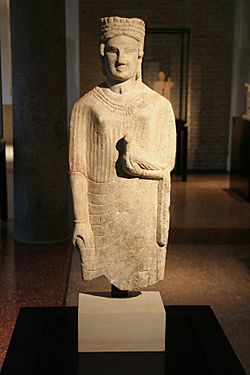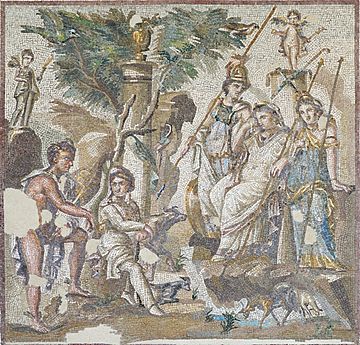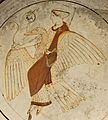Aphrodite facts for kids
Quick facts for kids Aphrodite |
|
|---|---|
| Goddess of love and beauty | |
| Member of the Twelve Olympians | |

Early fifth-century BC statue of Aphrodite from Cyprus, showing her wearing a cylinder crown and holding a dove
|
|
| Abode | Mount Olympus |
| Planet | Venus |
| Animals | dolphin, sparrow, dove, swan, hare, goose, bee, fish, butterfly |
| Symbol | rose, seashell, pearl, mirror, girdle, anemone, lettuce, narcissus |
| Tree | myrrh, myrtle, apple, pomegranate |
| Day | Friday (hēméra Aphrodítēs) |
| Personal information | |
| Consort | Hephaestus (divorced) Ares (unmarried consort) |
| Children | Eros, Phobos, Deimos, Harmonia, Pothos, Anteros, Himeros, Hermaphroditus, Rhodos, Eryx, Peitho, The Graces, Priapus, Aeneas |
| Parents | Zeus and Dione (according to Homer) Uranus (according to Hesiod) |
| Siblings | The Titans, the Hecatoncheires, the Cyclopes, The Meliae, the Erinyes, the Giants (as daughter of Uranus) or Aeacus, Angelos, Apollo, Ares, Artemis, Athena, Dionysus, Eileithyia, Enyo, Eris, Ersa, Hebe, Helen of Troy, Hephaestus, Heracles, Hermes, Minos, Pandia, Persephone, Perseus, Rhadamanthus, the Graces, the Horae, the Litae, the Muses, the Moirai (as daughter of Zeus) |
| Equivalents | |
| Roman equivalent | Venus |
| Norse equivalent | Freyja |
| Etruscan equivalent | Turan |
| Hinduism equivalent | Rati |
| Canaanite equivalent | Astarte |
| Babylonian equivalent | Ishtar |
| Sumerian equivalent | Inanna |
Aphrodite ( AF-rə-DY-tee; Greek: Ἀφροδίτη, translit. Aphrodítē;) is an ancient Greek goddess. Aphrodite is associated with love, beauty, pleasure, passion, and procreation. Aphrodite's main cult centers were Cythera, Cyprus, Corinth, and Athens.
Contents
Origins
There are different myths that tell a story of Aphrodite's birth. In his Theogony, Hesiod stated that Aphrodite was born off the coast of Cythera from the sea foam. The foam was produced by Uranus's body parts, which his son Cronus had cut off and thrown into the sea. Traditionally, the name "Aphrodite" is interpreted as "risen from the foam".
In Homer's Iliad, however, she is the daughter of Zeus and Dione. Plato, in his Symposium, says that there are two Aphrodites: Aphrodite Ourania ("Heavenly" Aphrodite) and Aphrodite Pandemos (Aphrodite common to "all the people").
According to Apollodorus, she is the thirteenth Titan, child of Gaia and Uranus.
Marriage and children
In Greek mythology, Aphrodite was married to Hephaestus, the god of fire, blacksmiths and metalworking. Hephaestus was happy to be married to Aphrodite and gave her many pieces of jewelry which were gifts of love. One of them was a magic belt. Whenever she wore it, men were attracted to her. Aphrodite was not attreacted to Hephaestus. She was frequently unfaithful to him and had many lovers.
In the Iliad, Aphrodite is no longer Hephaestus's wife, but is an unmarried partner of Ares, (pronounced air-es), the god of war. Her children with Ares are Harmonia, Deimos (pronounced day-mos), and Phobosis.
Aphrodite was the mother of the Trojan hero Aeneas in Greek mythology.
The fertility god Priapus was usually considered to be Aphrodite's son by Dionysus, but he was sometimes also described as her son by Hermes, Adonis, or even Zeus.
Some myths describe Eros as Aphrodite's son.
Mythology
Priapus
While Aphrodite was pregnant with Priapus, Hera envied her and applied an evil potion to her belly while she was sleeping to ensure that the child would be hideous. In another version, Hera cursed Aphrodite's unborn son because he had been fathered by Zeus.
When Aphrodite gave birth, she was horrified to see the child and abandoned him. A herdsman found him and raised him, later discovering that Priapus could aid in the growth of plants.
Anchises
Zeus made Aphrodite fall in love with Anchises, a handsome mortal shepherd who lived in the foothills beneath Mount Ida near the city of Troy.
Aphrodite told him that she was not a goddess, but the daughter of one of the noble families of Phrygia. She claimed to be able to understand the Trojan language because she had a Trojan nurse as a child.
Later, Aphrodite revealed her true divine form. Anchises was terrified, but Aphrodite promised that she will bear him a son. She prophesied that their son would be the demigod Aeneas, who would become a nobleman like his father.
Adonis
Adonis was the son of Myrrha, who was cursed by Aphrodite, after Myrrha's mother bragged that her daughter was more beautiful than the goddess. Driven out after becoming pregnant, Myrrha was changed into a myrrh tree, but still gave birth to Adonis.
Aphrodite found the baby and took him to the underworld to be fostered by Persephone. She returned for him once he was grown and discovered him to be strikingly handsome.
Persephone wanted to keep Adonis. The two goddesses argued over him. Zeus settled the dispute saying that Adonis would spend one third of the year with Aphrodite, one third with Persephone, and one third with whomever he chose. Adonis chose to spend that time with Aphrodite. Then, one day, while Adonis was hunting, he was wounded by a wild boar and bled to death in Aphrodite's arms.
Pygmalion
Pygmalion was an exceedingly handsome sculptor from the island of Cyprus. He was so sickened by the immorality of women that he refused to marry.
He carved the ivory cult statue he was carving of Aphrodite and fell madly and passionately in love with it. He wanted to marry it. Because Pygmalion was extremely devoted to Aphrodite, the goddess brought the statue to life. Pygmalion married the girl the statue became and they had a son named Paphos, after whom the capital of Cyprus received its name.
Anger myths
Aphrodite generously rewarded those who honored her, but also punished those who disrespected her, often quite brutally.
When the women of the island of Lemnos refused to sacrifice to Aphrodite, the goddess cursed them to stink horribly.
Glaucus of Corinth angered Aphrodite by refusing to let his horses for chariot racing mate. During the chariot race at the funeral games of King Pelias, Aphrodite drove his horses mad and they killed him.
Judgment of Paris and Trojan War

Along with Athena and Hera, Aphrodite was one of the three goddesses whose feud resulted in the beginning of the Trojan War.
All the gods and goddesses as well as various mortals were invited to the marriage of Peleus and Thetis (the eventual parents of Achilles). Only Eris, goddess of discord, was not invited. She was annoyed at this, so she arrived with a golden apple inscribed with the word καλλίστῃ (kallistēi, "for the fairest"), which she threw among the goddesses. Aphrodite, Hera, and Athena all claimed to be the fairest, and thus the rightful owner of the apple.
The goddesses turned to Zeus and asked him to settle the dispute, but put the choice into the hands of Paris, a Trojan prince.
All three goddesses were ideally beautiful and Paris could not decide between them, so they tried to bribe him. Hera offered him power over all Asia and Europe, and Athena offered wisdom, fame and glory in battle, but Aphrodite promised Paris that, if he were to choose her as the fairest, she would let him marry the most beautiful woman on earth. This woman was Helen, who was already married to King Menelaus of Sparta. Paris selected Aphrodite and awarded her the apple. The other two goddesses were enraged and, as a direct result, sided with the Greeks in the Trojan War.
Aphrodite plays an important and active role throughout the entirety of Homer's Iliad. She helps Paris and makes Helen fall in love with him.
Interesting facts about Aphrodite
- Goddess Venus is her counterpart in Roman mythology. Venus was originally a goddess of agricultural fertility, vegetation, and springtime.
- Aphrodite's major symbols are myrtles, roses, doves, sparrows, and swans.
- Her main festival was the Aphrodisia, which was celebrated annually in midsummer.
- Aphrodite was accompanied by the three Charites - Aglaea ("Splendor"), Euphrosyne ("Good Cheer"), and Thalia ("Abundance").
- In Laconia, Aphrodite was worshipped as a warrior goddess.
- She was known as Cytherea (Lady of Cythera) and Cypris (Lady of Cyprus), because both locations claimed to be the place of her birth.
- Aphrodite has been featured in Western art as a symbol of female beauty and has appeared in numerous works of Western literature.
- Aphrodite has inspired numerous artists, poets, sculptures, musicians throught the centuries, from Ancient Greece to modern ages.
- Aphrodite is the central figure in Sandro Botticelli's painting Primavera, which has been described as "one of the most written about, and most controversial paintings in the world", and "one of the most popular paintings in Western art".
Related pages
Images for kids
-
Fifteenth century manuscript illumination of Venus, sitting on a rainbow, with her devotees offering her their hearts
-
Attic white-ground red-figured kylix of Aphrodite riding a swan (c. 46-470) found at Kameiros (Rhodes)
See also
 In Spanish: Afrodita para niños
In Spanish: Afrodita para niños






